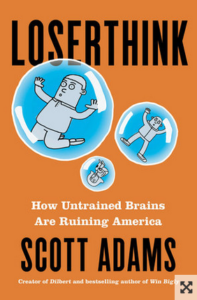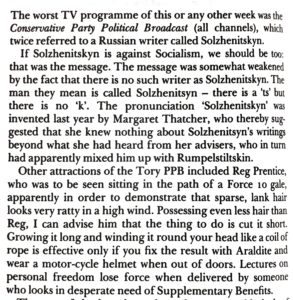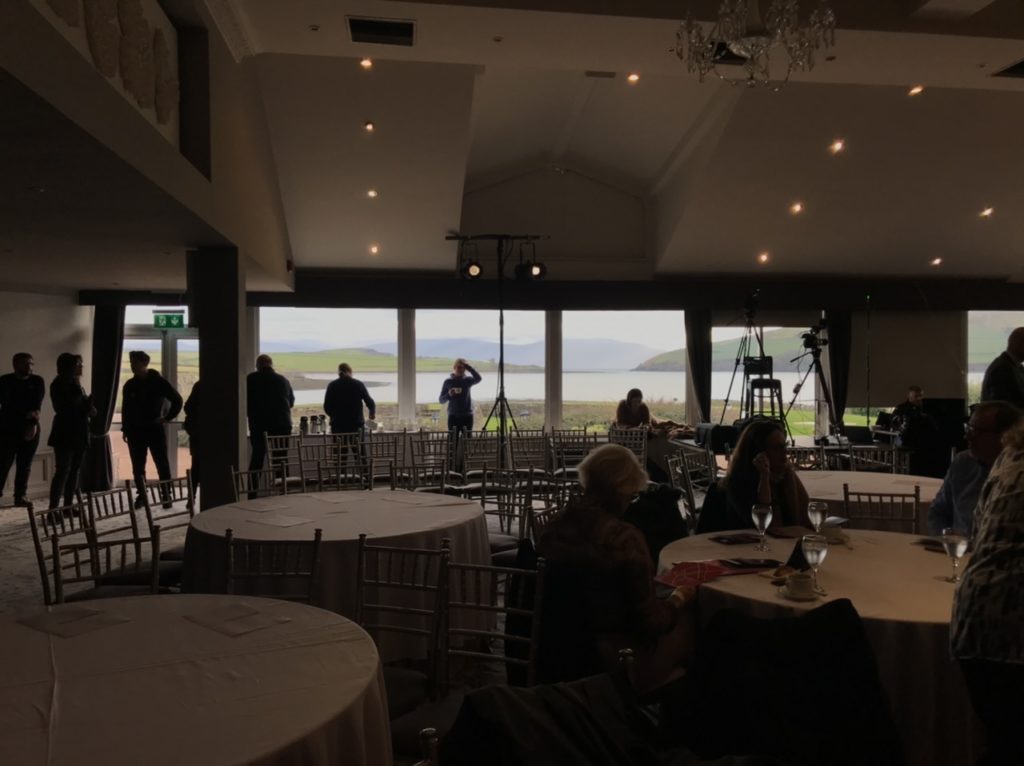- All new cell phone users in China must now have their face scanned How long before the UK governments says: “that’s a cool idea”?
- Dilbert’s creator has two rules for a more civilised Internet Scott Adams on learning from his experience.
- Why clean energy isn’t enough to tackle climate change Sure, we need to switch to renewables and electric cars etc. But first we have to reduce our use of fossil fuels. And that’s the really hard bit.
- How Memes Got Weaponized: A Short History Memes might start as a joke, but some people are starting to see them as the serious threat they can be. Sobering tale.
Loserthink
Scott Adams has a new book out. Note the subtitle. Blurb reads:
Even the smartest and most educated among us can slip into ‘loserthink,’ since we haven’t been exposed to the best thinking practices in every discipline. Psychologists, engineers, scientists, entrepreneurs, historians, and artists, for example, all see the world through different filters. If we don’t understand the basics of those filters, we’re likely to fall into loserthink. Some signs you’ve succumbed to loserthink include: inability to get your ego out of your decisions, thinking with words instead of reasons, failing to imagine alternative explanations, trusting your preferred news sources, and making too much of coincidences. And with the never-ending stream of urgent notifications on your phone and anger on your social media feeds, it’s easy to feel miserable, defensive, anxious, poor, and sick. But Adams offers a cure for loserthink by teaching you the most productive thinking practices from a variety of disciplines. In this book, you will learn how to… Recognise the walls of your own mental prison and break out. Understand the world in a way you have never seen it before. Be among the most perceptive and respected thinkers in every conversation. Your bubble of reality doesn’t have to be a prison. This book will show you how to break free.
Linkblog
- The TLS’s Books of the Year Predictably cosmopolitan, often abstruse and quirky. Lots of serious books I should read but probably won’t. Sigh.
- Go Master Lee Sedol says he quits because he’s unable to defeat AI Go machines Sensible chap.
- What is a “narrative violation”? No, I didn’t know eIther. Turns out, it’s just a way to challenge conventional wisdom. But apparently it is the obsession du jour in Silicon Valley at the moment. It’s the kind of thing that gives superficiality a bad name.
- Why you shouldn’t spend too much time thinking about 5G Horse sense from Benedict Evans.
Remembering Clive James
Clive at his deadliest — in the Observer, March 7, 1976
From my tribute to him in today’s paper…
I was privileged to be his successor-but-one. (When he stood down from the paper in 1982, Julian Barnes took over, and I then succeeded Julian in 1987.) I knew when I accepted the job that it would be a tough assignment. Indeed, I had learned that lesson 10 years earlier, because occasionally – when Clive’s TV work took him abroad – I used to be called in by Terry Kilmartin, the Observer’s then literary editor and éminence grise.
On one such occasion, after labouring mightily on the column, I caught the London train on the Sunday morning. Two very grand middle-aged ladies got in and sat opposite me. One of them had a copy of the Observer, and I watched, entranced, as she immediately went to the back page and started to read. I saw her chuckle as the jokes detonated, and I felt a glow of quiet satisfaction: I had finally cracked it. And then, when she had finished reading, she handed the paper to her companion.
“Dorothy”, she said, “you really must read this. Clive James is very funny this morning!”
I may have stepped into his shoes. But they were too big for me. Which is why I miss him.
Podcasting: will it succumb to the Wu cycle?
This morning’s Observer column:
I’ve just been listening to what I think of as the first real podcast. The speaker is Dave Winer, the software genius whom I wrote about in October. He pioneered blogging and played a key role in the evolution of the RSS site-syndication technology that enabled users and applications to access updates to websites in a standardised, computer-readable format.
And the date of this podcast? 11 June, 2004 – 15 years ago; which rather puts into context the contemporary excitement about this supposedly new medium that is now – if you believe the hype – taking the world by storm. With digital technology it always pays to remember that it’s older than you think.
When he started doing it, Winer called it “audioblogging” and if you listen to his early experiments you can see why. They’re relaxed, friendly, digressive, unpretentious and insightful – in other words an accurate reflection of the man himself and of his blog. He thought of them as “morning coffee notes” – audio meditations about what was on his mind first thing in the morning…
Linkblog
- Guardian’s obituary of Clive James
- Serious noticing Tim Adams’s review of James Woods’s collection of essays Lovely review. I particularly liked this bit: “In the opening essay, Wood contrasts the two famous recordings of the Goldberg Variations made by Glenn Gould, one aged 22, the other three decades later; the first is “cocky, exuberant, optimistic”, the second “reflective, seasoned, wintry”. Wood’s mature ear prefers the latter, but part of him always “wants to be the first!” He doesn’t make the connection with his own work, but reading these essays, written over more than two decades, the comparison seems apt in some ways.
- Climate tipping points — too risky to bet against. The growing threat of abrupt and irreversible climate changes must compel political and economic action on emissions. Yeah, but will it? You know the answer.
Quote of the Day
“Foundations are an unaccountable, nontransparent, perpetual, and lavishly tax-advantaged exercise of power.”
- Robert Reich, former US Secretary of Labour and author of Just Giving: Why Philanthropy Is Failing Democracy and How It Can Do Better
Impunity vs. democracy
I’m at Ireland’s Edge, consistently the most interesting event I go to every year. It’s held in Dingle, which is on the westernmost edge of Europe and a place I’ve loved ever since I was a student. And what conference Centre anywhere has a backdrop like the one shown in the pic?
Yesterday, one of the sessions was on “A New Era of Investigative Journalism: Political Polarisation and Surveillance Capitalism”. It was moderated by Muireann Kelliher, co-inventor of Ireland’s Edge, and had a terrific panel: my Observer colleague Carole Cadwalladr, Peter Geoghegan of openDemocracy and Donie O’Sullivan of CNN. There was a spirited discussion of the way in which journalistic exposés of the blatant flouting of electoral and other laws in the Brexit referendum and the 2016 US presidential election by political parties, foreign and domestic actors and social media companies have not resulted in any meaningful penalties for the wrongdoers. The audience came away having been stirred by the manifest injustices and institutional dysfunctionality described by the journalists, but also (I think) deeply pessimistic that anything will be done about the problematique (to use the French term for a real mess) portrayed in the discussion.
On reflection, it occurs to me that the fundamental problem underpinning all this is impunity — i.e. the discovery that there are agents in liberal democracies which are able to behave badly without having to worry about the consequences. We saw this with the banks in the 2008 crisis, and we’re seeing it now with political activists, foreign actors and tech companies. And the reason this is so poisonous is that impunity goes to the heart of the matter. Democracy depends on the rule of law (not, as the Chinese regime maintains, rule by law). Its fundamental requirement is that no one or no institution is above the law, and what we’re discovering now is that that no longer holds in many democracies — and most shockingly in two supposedly mature democracies: the UK and the US.
How did we get here? One of the reasons is that since the 1970s governments and ruling elites have drunk the neoliberal Kool Aid which privileges markets — and the corporations that dominate them. One of the reasons the 2008 banking crisis happened is that in preceding decades the regulations under which banks operated were loosened (using the hoary old “red tape” trope) to create a legal environment in which they were able to screw the world economy with impunity. And our failure to anticipate the growth of tech power led to a failure to create a regulatory environment which would punish monopolistic and irresponsible business models. And now we’re living with the consequences.
Linkblog
- Meet the Leftish Economist With a New Story About Capitalism New York Times profile of Mariana Mazzucato. Don’t you love the term “leftish”?
- What happens to your Bitcoin when you die? There’s an insurance outfit that has you (and your legatees) covered. Isn’t capitalism wonderful? Full disclosure: I don’t have any cryptocurrency assets, so this is purely theoretical for me.
- Seeing Like a Finite State Machine Terrific challenge by Henry Farrell to the conventional Western wisdom about China and AI. The Comments thread that accompanies it is also interesting and thoughtful.
Back to the future
The FTC is suing Qualcomm, the chip maker, in the first major monopoly case since the Microsoft one all those years ago. In his weekly newsletter, Matt Stoller provides a useful historical comparison to put the case in its context:
Qualcomm is a very important corporation, but one you may not have heard of because it doesn’t do consumer oriented work. The company makes critical components for cell phones, the stuff you don’t see but that goes into the guts of telecom systems. Its technology connects phones to cell networks, and it makes its money by selling chips and by licensing its patents to device makers.
The story of how Qualcomm monopolizes is pretty simple. The corporation does what Bill Gates did to computer manufacturers and what John D. Rockefeller did to railroads, as I wrote a few weeks ago. Rockefeller’s oil was critical to railroads, and Gates’s operating system software was critical to computer makers. Both of them thus forced their dependents to give them a fee not just for every Rockefeller barrel of oil or Microsoft OS license, but a fee for every one of their competitors’ as well. They taxed their competition and made it impossible to compete.
Qualcomm does this as well. As its competitor Intel explained, Qualcomm “refuses to sell [phone makers] any chipsets unless those manufacturers also purchase separate patent licenses that require them to pay exorbitant royalties for every handset they sell, regardless of whether the handset contains a Qualcomm chipset.” In other words, it’s the Gates/Rockefeller playbook. Find an essential chokehold, and use it to control the industry.
Qualcomm uses a few other anti-competitive tactics. It refused to license its patents – essentially standard and necessary for the industry – to competitors. And it cut exclusive deal arrangements with customers to box anyone else out of the market. (You can read the rest of Intel’s amicus brief if you want to hear expensive lawyers accurately whine about being treated unfairly.)
The strange thing is, though, that important sectors of the US government are trying to intervene in the case, effectively opposing the FTC. Their argument is that the suit undermines national security.
The DOJ argument is basically saying, yeah, Qualcomm does all that stuff, but Judge Gorsuch said it’s all legal and efficient, and we don’t want to dissuade the liberty to abuse patents and market power. Two other officials, one at the Department of Defense and another at the Department of Energy, also weighed in. Ellen Lord, a former defense contractor and the Under Secretary of Defense for Acquisition and Sustainment for the DOD, argued that Qualcomm’s position as a monopolist enables it to support national security and help China. A Department of Energy official Max Everett basically said the same thing.
The national security argument is BS, says Stoller, but not for the reason you’d think. He quotes an excerpt from a WSJ OpEd by Michael Chertoff, a former senior Cabinet officer in previous US administrations.
In the technology race against China, the U.S. should prefer to let competition drive innovation rather than support exclusive national champions. Apart from the economic inefficiency, a single-source national champion creates an unacceptable risk to American security—artificially concentrating vulnerability in a single point. The government’s argument in support of Qualcomm isn’t prudent, and if courts accept it, the result would be a self-inflicted wound to U.S. national interests. We need competition and multiple providers, not a potentially vulnerable technological monoculture.
Underpinning this argument is a prevailing denialism about China in the American Deep State. What happens, Stoller says, is that China either hacks US corporations to steal their intellectual property, or acquires it legally when they try to do business in China. So: China innovates at speed by topping up its own (substantial) native ingenuity with the ideas and wisdom of its US competitors, while those same competitors are locked out by monopolisation and patent restrictions from exploiting that same, locally-developed intellectual property in their own country.
End result: China races ahead. Madness on stilts.



